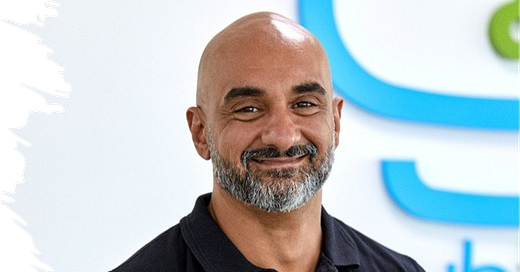This week the BIG5D Podcast welcomes grubtech Co-founder and CEO Mohamed Al Fayed. Grubtech is emerging as a key infrastructure player in the UAE’s exploding ghost kitchen scene.
Dubai-based grubtech (founded in 2019) doesn’t operate virtual restaurants. The company has built an operating system to address the friction points arising from running a high-volume food delivery business. Its software provides the efficiency needed to serve multiple delivery-only brands from a single location.
“Our key takeaway from studying the space was that there was no out of the box or native built technology to power these operations,” Mohamed said.
While MENA-based, grubtech has global ambitions. Mohamed tells us the company currently has active customers in more than seven counties. Outside of MENA, grubtech has customers in Singapore and Pakistan, with plans to add Malaysia and the Philippines soon. He says the company is in talks to expand into Europe and North America as well.
In March, grubtech announced a $3.4 million pre-Series A funding round to fuel its product development and expansion. This followed a $2 million seed round in mid-2020.
Our conversation goes pretty deep into the mechanics of ghost kitchens. And we learned about some interesting new trends along the way. One is micro-cloud kitchens. That’s when a local restaurant uses its excess capacity to fulfill delivery orders for another dining brand. So the space operates along both distributed and concentrated models.
We also learned that many originally virtual dining brands are now branching out and launching brick and mortar locations. What’s old is new again.
And we spoke at length with Mohamed about the tehnological future of ghost kitchens. Things like AI-driven personalization and integrtations with wearables. Not to mention ultiizaiton optimization aided by machine learning. All of these and more are on the horizon.
You can watch the full interview on YouTube.
Here are some key passages from this episode.
Why are cloud kitchens/virtual restaurants so popular in MENA?
“When it comes down to online food, we have some of the world's highest order per capita rates. Take a country like Kuwait, I think the order per capita there is almost five per person. So that's five orders a day per human living in Kuwait. So we've always been on the forefront of online food, primarily because of convenience. And obviously, optionality. And we drive a lot of technological innovation from that perspective in that sector.
“So cloud kitchens have almost been seeded here, or at least fortified here, in this part of the world. And they continue to grow very rapidly. So that's contributed to…the proliferation of cloud kitchens in our part of the world.”
Why do cloud kitchens need unique software?
“Our key takeaway from studying the space was that there was no out of the box or native built technology to power these operations. Single brand, single location works fine. Single brand, multiple locations works fine. But when you jam in one location, multiple brands, the existing technology providers really have a hard time with that.
“So a lot of these cloud kitchens built their own technology or kind of customize what was already out there. But to be quite honest with you, it was rickety. It was not very efficient. And it was largely built on a lot of legacy technology. So we saw that as an opportunity, as whitespace.
“We started the company in 2019. so the pandemic was obviously not with us. And we had made a big bet that cloud kitchens are going to be a driving force for how we consume food. And as these operators continue to expand geographically and their business models, they would need a tech enabler.”
What does it take to succeed in the virtual restaurant space?
“The ones we saw succeed were the ones who stuck to the DNA of what good food is. So quality for money, speed of delivery, and consistency. Those are the ones who have managed to survive the shakeout of the virtual brands.
“Another key success factor that we saw with virtual brands that those who went in with a view that they'll just put them into one or two stores that just serves like 10 or 15 kilometers, didn't do so well. Those who had big physical fleets like 50-plus stores, and were able to deploy that virtual brand over a wider area of coverage were able to justify the effort and the investment that went into creating a virtual brand.”
What will happen to ghost kitchens post-Covid?
“This quesiton was debated effusively by our investors. And my response was always the same. Look at online food penetration as a sector. And if you take a global outlook on it, it's still single digits, and some would put it as low as four to five, some will put it as high as seven to eight. But it's still single digits.
“Now, look at how we consume everything else in our life, right? Whether it's media through Netflix, or Apple TV, even down to our groceries or our office needs. You have Amazon. So you've got high double-digit penetrations, in the 30s and 40s, on how we consume our clothes, our commodities, etc. But something as reoccurring as food is still at single digits. What do you think is going to happen? It's going to catch up, right? I mean, we live in our phones and when we press a button, things just appear. So that is not going anywhere. And that consumer behavior obviously was catalyzed by the pandemic, and it will just continue to move forward.
“And as the cost structure of online food becomes cheaper and cheaper, you're already starting to see the impact. New apartment buildings are being built with much smaller kitchens. Because cooking is now a hobby, not a necessity. I can consume food at a cheaper price than having to go to the grocery store, buy all its components, spend an hour or two putting it together. I'll get the same output and a cheaper price, right? So that's here to stay. We've got a lot of headroom to go. The pandemic just helped us accelerate, but it definitely is not going to flatten out or plateau.”
What innovations are you working on at grubtech?
“I think there was a study that said most restaurants run at around 34% capacity. So how do we marry brands that want expansion without capex with this dormant capacity? And do so with science, rather than just arbitrarily…We're spending a lot of time on breaking that problem down. And we're quite confident that we've found a solution.”


















Share this post